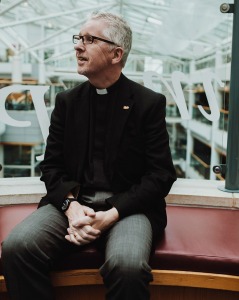Sheffield Cathedral. Evening Prayer with Hymns (Trinity 10) 24.08.14
Readings: 2 Kings 6.8-23; 3.16-end; Acts 17.15-end
Some of you will no doubt remember Woolworth’s pick-and-mix sweet counters. You could go around choosing a few of these and few of those before going to the counter and realising that your quarter-pound of favourites was actually nearer a pound in weight, but buying them anyway. Good old ‘Woolies’ blazed the trail for pick and mix. What a shame they went out of business.
The idea, of course, caught on and the pick-and-mix idea can be found in all sorts of places. For example, restaurants, supermarkets, DIY stores all have variations on the pick-and-mix idea; and there is something quite satisfying and creative about being able to make those choices which bring together unexpected combinations.
But pick-and-mix can be problematic if we apply that approach uncritically to other aspects of life, not least to religious belief and practice. There are, of course, many practices within different religious traditions which can be shared and benefited from. In fact, if we close ourselves off from the possibility that we might actually learn something from another religion we come dangerously close to deciding where and how God can work by setting limits where and how God works.
Buddhist meditation and Christian contemplative prayer are not mutually exclusive. The use of Rosary beads and Muslim prayer beads are similar techniques in Christianity and Islam respectively, for helping focus the mind on prayer and avoiding distractions. Pilgrimage – for example, to Santiago de Compostella or Jerusalem for Christians, Varanasi on the Ganges for Hindus, and Mecca for Muslims – marks a connection with something important within the faith tradition. We can learn from each other about the benefits of such practices in the life of faith. They are not
Ultimately, of course, there are in any religion foundational beliefs that set it apart from other religions and define its unique identity. For Christians it is about seeing God as revealed uniquely through Jesus Christ which is its essential feature. That is not a pick-and-mix option but the essential hallmark of Christian belief.
In the reading from the Acts of the Apostles, the apostle Paul draws out a similar point. Finding himself in Athens in the midst of a market place of competing philosophies and religions, he spots an altar with the inscription ‘To an unknown God’.
Never one to miss an opportunity, Paul goes on to say that he can tell the Athenians who this unknown God is and he makes the connection between Jesus and God, pointing out how God raised Jesus from the dead. Notice how he does this, because it teaches us much about how to go about making the known the God whom we see revealed in Jesus to people of other faiths without being dismissive about their own genuine religious quest.
The Athenians were passionate about religious beliefs and philosophies, always on the lookout for new and interesting ideas about life and the universe. They were seekers after truth. Paul started from that point. He did not dismiss or criticise them but affirmed them: ‘I see how extremely religious you are in every way . . .’ There is no suggestion that he was being sarcastic. He was, rather, connecting with them in their search, and he went on to tell them about Jesus by linking him with the unknown God for whom an altar was already set up.
We don’t have to be dismissive of the faith of other people when we share our own faith in Jesus, but simply declare what he means for us. The God who made heaven and earth whose likeness we see in Jesus is the one whom we worship. It’s not about arguing points but sharing an experience.
It does not appear that the Athenians were actually that impressed with Paul’s attempt to proclaim the gospel in a culturally relevant way. They seem to have liked the novelty of Paul’s message but were then less keen on the implications. To take Paul’s message seriously meant accepting that in Jesus, God had indeed come among us. There were implications for living that the Athenians were not prepared to accept. So they moved on to the next interesting idea.
The fact of the matter is that through Jesus, God’s very presence was made known to humankind, and that is something that cannot but effect change in a person’s life if it is accepted, not least because it places on our shoulders a responsibility to play our part in making God known to others. Again, there is no pick-and-mix option here. To believe in Jesus is to follow him, and to follow him is align ourselves with his priorities. Moving on to the next thing because faith in Jesus might cause some inconvence, as the Athenians did, is not an option for anyone who takes Christian faith seriously.
As Pope Francis puts it: ‘Our mission as Christians is to conform ourselves to Jesus as the model of our lives.’ It is a sure way of helping to make God known.
The task, then, of the universal church of which we in this Cathedral are a local branch in this part of God’s world, is to bear witness to the risen Jesus through whom we believe God is made known most clearly. It is our call and responsibility to continue his work in the world through our words, actions, and presence at every level of society.
May our prayer today be that we that we remain faithful to our call to bear witness in our lives to the glorious presence of the Risen Christ; and, through our lives, to play our part in helping make the unknown God known to those who have yet to discover the God we know and love in Jesus.
